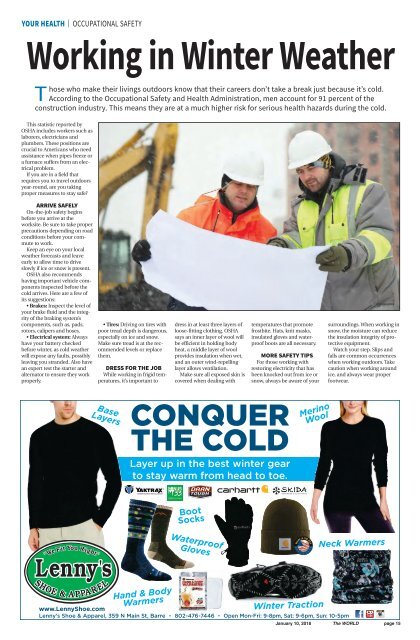World 01_10_18
The World Your Health Special Supplement Barre-Montpelier, VT
The World
Your Health Special Supplement
Barre-Montpelier, VT
You also want an ePaper? Increase the reach of your titles
YUMPU automatically turns print PDFs into web optimized ePapers that Google loves.
YOUR HEALTH | OCCUPATIONAL SAFETY<br />
Working in Winter Weather<br />
Those who make their livings outdoors know that their careers don’t take a break just because it’s cold.<br />
According to the Occupational Safety and Health Administration, men account for 91 percent of the<br />
construction industry. This means they are at a much higher risk for serious health hazards during the cold.<br />
This statistic reported by<br />
OSHA includes workers such as<br />
laborers, electricians and<br />
plumbers. These positions are<br />
crucial to Americans who need<br />
assistance when pipes freeze or<br />
a furnace suffers from an electrical<br />
problem.<br />
If you are in a field that<br />
requires you to travel outdoors<br />
year-round, are you taking<br />
proper measures to stay safe?<br />
ARRIVE SAFELY<br />
On-the-job safety begins<br />
before you arrive at the<br />
worksite. Be sure to take proper<br />
precautions depending on road<br />
conditions before your commute<br />
to work.<br />
Keep an eye on your local<br />
weather forecasts and leave<br />
early to allow time to drive<br />
slowly if ice or snow is present.<br />
OSHA also recommends<br />
having important vehicle components<br />
inspected before the<br />
cold arrives. Here are a few of<br />
its suggestions:<br />
• Brakes: Inspect the level of<br />
your brake fluid and the integrity<br />
of the braking system’s<br />
components, such as, pads,<br />
rotors, calipers and hoses.<br />
• Electrical system: Always<br />
have your battery checked<br />
before winter, as cold weather<br />
will expose any faults, possibly<br />
leaving you stranded. Also have<br />
an expert test the starter and<br />
alternator to ensure they work<br />
properly.<br />
• Tires: Driving on tires with<br />
poor tread depth is dangerous,<br />
especially on ice and snow.<br />
Make sure tread is at the recommended<br />
levels or replace<br />
them.<br />
DRESS FOR THE JOB<br />
While working in frigid temperatures,<br />
it’s important to<br />
dress in at least three layers of<br />
loose-fitting clothing. OSHA<br />
says an inner layer of wool will<br />
be efficient in holding body<br />
heat, a middle layer of wool<br />
provides insulation when wet,<br />
and an outer wind-repelling<br />
layer allows ventilation.<br />
Make sure all exposed skin is<br />
covered when dealing with<br />
temperatures that promote<br />
frostbite. Hats, knit masks,<br />
insulated gloves and waterproof<br />
boots are all necessary.<br />
MORE SAFETY TIPS<br />
For those working with<br />
restoring electricity that has<br />
been knocked out from ice or<br />
snow, always be aware of your<br />
© ADOBE STOCK<br />
surroundings. When working in<br />
snow, the moisture can reduce<br />
the insulation integrity of protective<br />
equipment.<br />
Watch your step. Slips and<br />
falls are common occurrences<br />
when working outdoors. Take<br />
caution when working around<br />
ice, and always wear proper<br />
footwear.<br />
Base<br />
Layers<br />
CONQUER<br />
THE COLD<br />
Layer up in the best winter gear<br />
to stay warm from head to toe.<br />
Merino<br />
Wool<br />
Boot<br />
Socks<br />
Waterproof<br />
Gloves<br />
Neck Warmers<br />
Hand & Body<br />
Warmers<br />
Winter Traction<br />
www.LennyShoe.com<br />
Lenny’s Shoe & Apparel, 359 N Main St, Barre • 802-476-7446 • Open Mon-Fri: 9-8pm, Sat: 9-6pm, Sun: <strong>10</strong>-5pm<br />
January <strong>10</strong>, 2<strong>01</strong>8 The WORLD page 15

















